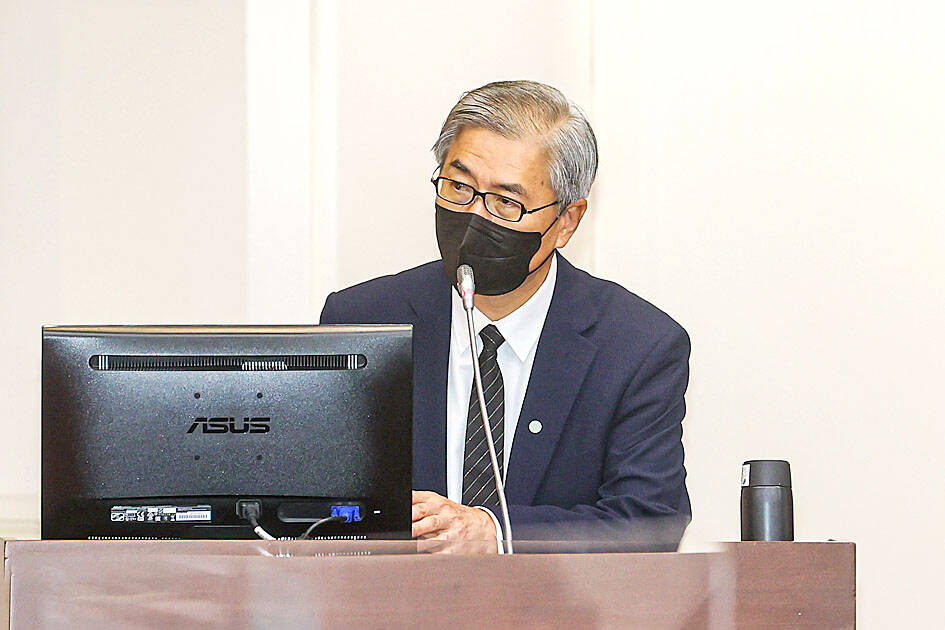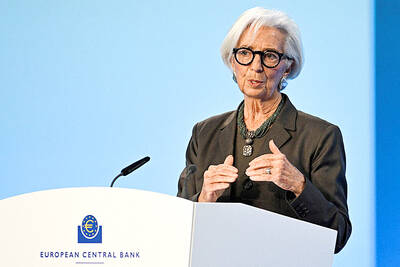The Financial Supervisory Commission (FSC) is moving to bolster the market’s defenses in the face of outflows set to reach the highest level in two decades.
“We are at a period of transition and I believe foreign investors will return to Taiwan’s markets eventually,” Financial Supervisory Commission (FSC) Chairman Thomas Huang (黃天牧) said in an interview on Wednesday.
At the same time, DBS Group Holdings Ltd is expected to make big investments after completing its deal to buy Citigroup Inc’s consumer banking assets in Taiwan, Huang said.

Photo: CNA
Increased tensions that affect Taiwan, including tighter US control over chip exports to China, have dimmed the nation’s economic outlook.
The turbulence has led global financial firms to reassess the risks of doing business in the region and global funds to pull money out at the fastest pace in two decades.
For Huang, factors affecting foreign investment outflows include interest rate hikes by the US Federal Reserve, inflation concerns and supply chain issues.
“They are all related to changes in the international political and economic situation,” he said.
More global financial institutions are likely to move to Taiwan after some joined this year, he said, without naming any of the companies that have expressed interest in Taiwan.
“DBS will become Taiwan’s largest foreign bank in retail banking after completing the deal with Citigroup, and it’s expected to make lots of investments for equipment and talent to retain local customers,” Huang said.
Even so, the turmoil is affecting decisionmaking at banks.
UBS Group AG, for example, has asked its Taiwan-based trading desk to assess its contingency planning and see how it can lower exposure to the nation.
Insurers are also backing away from writing new policies to cover firms investing in Taiwan.
Banking Bureau Director-General Sherri Chuang (莊琇媛) said that “as far as we know” no foreign banks have plans to leave or downsize locally.
The TAIEX has fallen about 30 percent from a record high in January, among the world’s worst-performing stock markets this year. Global funds have pulled more than US$46 billion from local equities this year, on track for the biggest annual outflow in more than two decades.
Last week, the commission beefed up curbs on short-selling to maintain stability in the securities market after initiating a similar measure at the end of last month.
The commission has prepared further stabilizing measures, but would only implement those at the appropriate time, Huang said.
The government’s National Stabilization Fund has also supported the market with more than NT$10 billion (US$311.46 million) of securities purchases as of the end of last month.
“I don’t know when foreign investors will return, but I know the Fed hiked rates to counter inflation and may change monetary policy again once inflation is contained,” Huang said. “What I can do is to increase resilience of Taiwan’s financial system and capital markets.”
Meanwhile, the local insurance industry has buffered itself against surging COVID-19 claims after raising capital, Huang said.
The non-life insurance companies have no problems fulfilling their obligations in paying claims so far, he said.
Life insurers also do not face any operational problems after being allowed to reclassify some assets to cope with further interest rate increases from the Fed, he added.
Firms such as Fubon Financial Holding Co (富邦金控) and Cathay Financial Holding Co (國泰金控) face steep headwinds amid rising interest rates and falling stock markets at the same time as they are being hit hard by surging claims on COVID-19-related policies.
Rapid rate increases by the Fed have weighed heavily on the local insurance industry, which has more than 60 percent of its investment portfolio in US bonds, JPMorgan Chase & Co research showed.
“This is a turbulent situation, and the financial regulator should be cautious and fearful,” Huang said. “We must be very careful in responding to interest rate hikes or different changes in the future.”
The turmoil this month prompted the commission to allow the firms to reclassify their assets to improve their financial ratios, and the regulator has also asked insurers to set aside special reserves to ensure capital adequacy.
At present, four life insurance companies are expected to reclassify their assets, Huang said.
Two are life insurance companies under financial holding firms, one is a pure insurance firm and the other is a British company, he said.
They account for 47 percent of the industry by total assets, he said.
Insurers have so far paid out NT$100.7 billion in COVID-19 claims, while only reaping about NT$4.5 billion in revenue on those policies.

European Central Bank (ECB) President Christine Lagarde is expected to step down from her role before her eight-year term ends in October next year, the Financial Times reported. Lagarde wants to leave before the French presidential election in April next year, which would allow French President Emmanuel Macron and German Chancellor Friedrich Merz to find her replacement together, the report said, citing an unidentified person familiar with her thoughts on the matter. It is not clear yet when she might exit, the report said. “President Lagarde is totally focused on her mission and has not taken any decision regarding the end of

French President Emmanuel Macron told a global artificial intelligence (AI) summit in India yesterday he was determined to ensure safe oversight of the fast-evolving technology. The EU has led the way for global regulation with its Artificial Intelligence Act, which was adopted in 2024 and is coming into force in phases. “We are determined to continue to shape the rules of the game... with our allies such as India,” Macron said in New Delhi. “Europe is not blindly focused on regulation — Europe is a space for innovation and investment, but it is a safe space.” The AI Impact Summit is the fourth

CONFUSION: Taiwan, Japan and other big exporters are cautiously monitoring the situation, while analysts said more Trump responses ate likely after his loss in court US trading partners in Asia started weighing fresh uncertainties yesterday after President Donald Trump vowed to impose a new tariff on imports, hours after the Supreme Court struck down many of the sweeping levies he used to launch a global trade war. The court’s ruling invalidated a number of tariffs that the Trump administration had imposed on Asian export powerhouses from China and South Korea to Japan and Taiwan, the world’s largest chip maker and a key player in tech supply chains. Within hours, Trump said he would impose a new 10 percent duty on US imports from all countries starting on

STRATEGIC ALLIANCE: The initiative is aimed at protecting semiconductor supply chain resilience to reduce dependence on China-dominated manufacturing hubs India yesterday joined a US-led initiative to strengthen technology cooperation among strategic allies in a move that underscores the nations’ warming ties after a brief strain over New Delhi’s unabated purchase of discounted Russian oil. The decision aligns India closely with Washington’s efforts to build secure supply chains for semiconductors, advanced manufacturing and critical technologies at a time when geopolitical competition with China is intensifying. It also signals a reset in relations following friction over energy trade and tariffs. Nations that have joined the Pax Silica framework include Japan, South Korea, the UK and Israel. “Pax Silica will be a group of nations